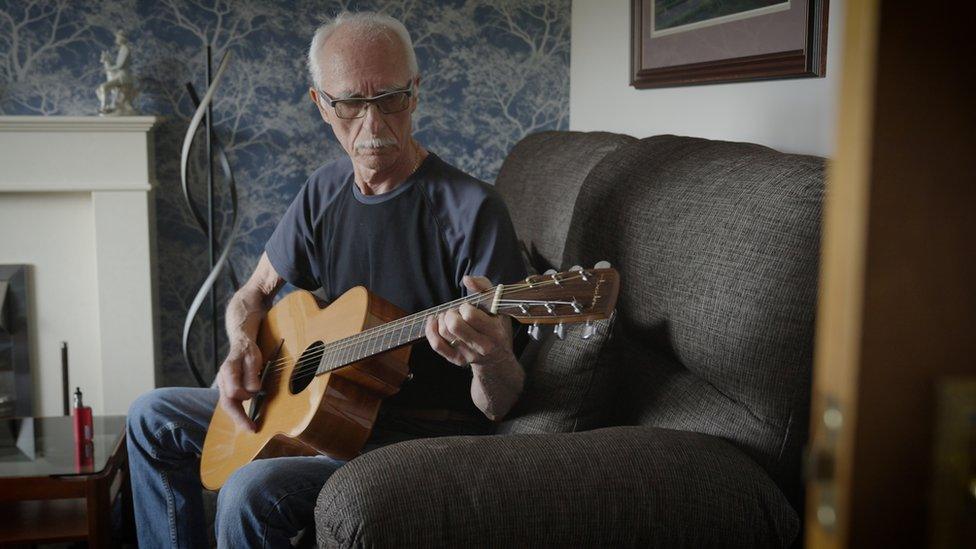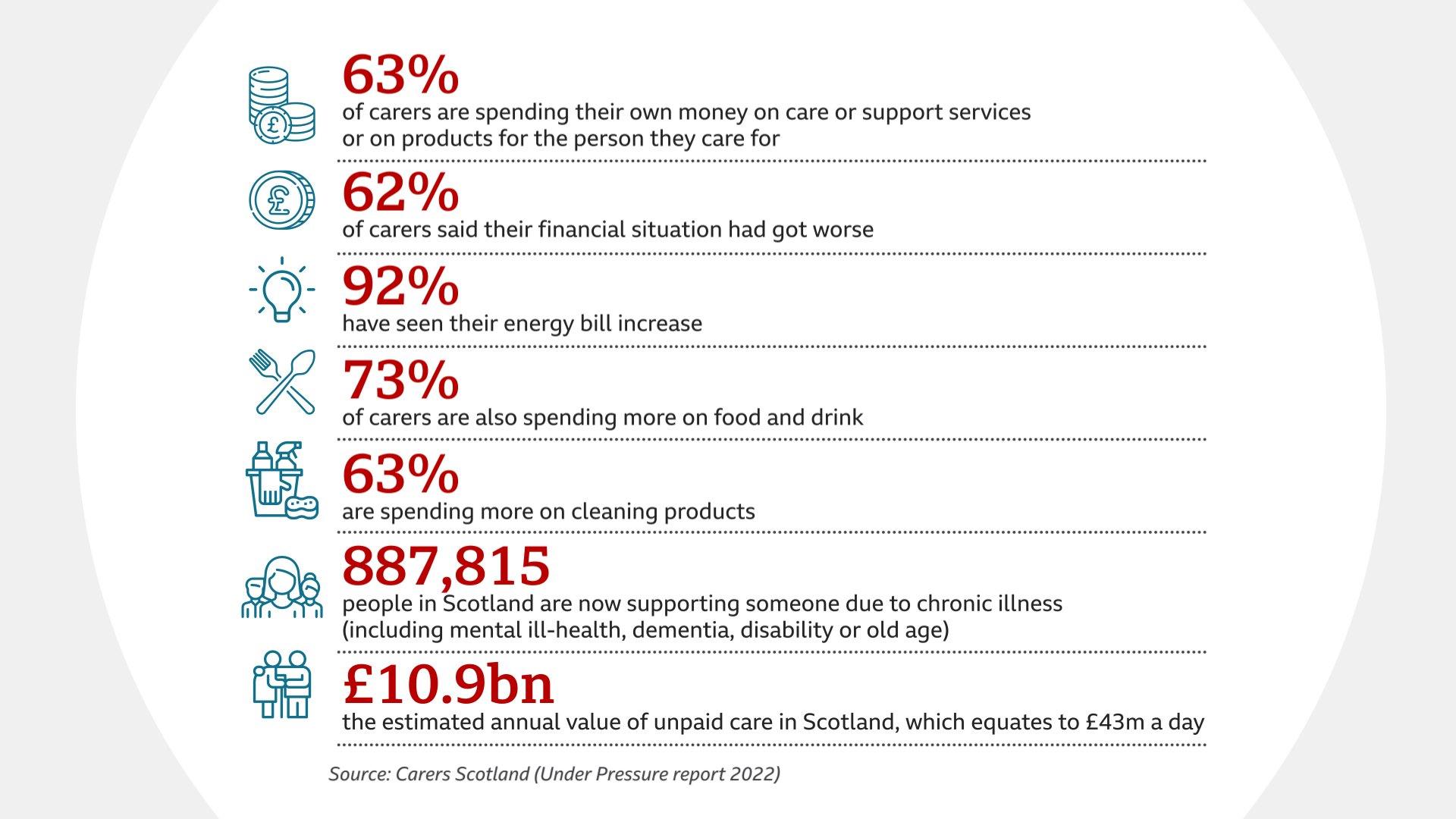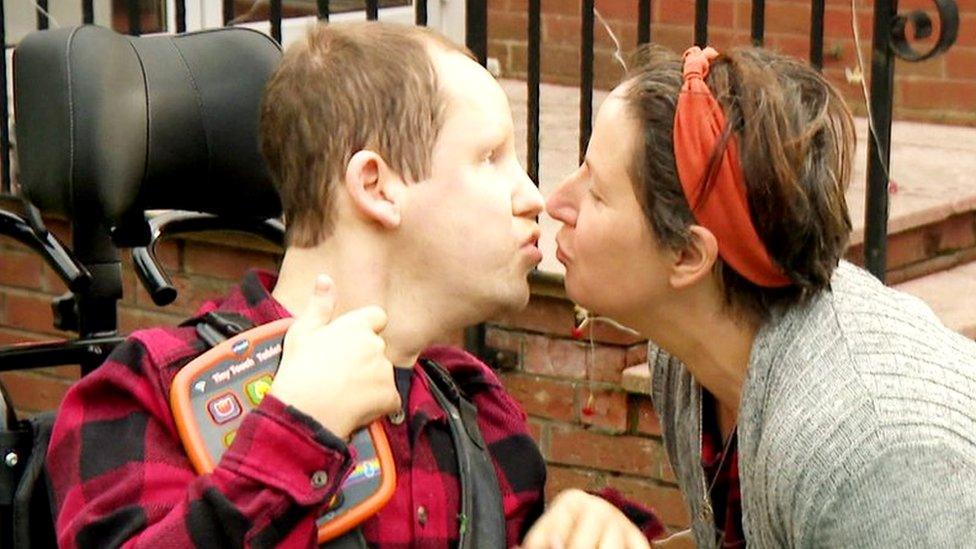I've wanted to run away from being husband's carer
- Published
Stevie Nagle worries how she will cope with no help in the future
In their early courtship, Stevie and Grant Nagel's home was filled with music.
The couple met in 1998 - both members of folk and rock bands in Glasgow - and would spend hours jamming with friends to well-worn favourites by The Waterboys and The Pogues.
"I always remember one Christmas, we were playing in a bar in Shawlands and we had all the bar staff dancing on tables," Stevie said.
Now married 21 years, the pair live a quieter life in Stonehouse, South Lanarkshire - one Stevie says she had not imagined for herself.

Stevie and Grant used to perform in bands in Glasgow
Grant was diagnosed with cognitive impairment and more recently with dementia - and for the last six years Stevie has been his primary carer.
She told BBC Scotland she had seen his short-term memory and his mood become significantly altered by his illness.
She said: "When we got married my daughter did a speech and she said 'Grant's a great guy, he's so gentle, he's so kind, he's just perfect for mum' - and now he's changed. Now he's bad tempered.
"I'm really depressed. I didn't realise that I'd signed up for this. It gets me - sometimes I could run away to be honest.
"[My daughter] said 'mum we know you love Grant so much but you're so frustrated with him' - I wish I wasn't but I am."

Grant still plays his guitar and harmonica
Grant, now 75, still plays his guitar and harmonica - though no longer in public - and is occasionally able to go out walking by himself.
Otherwise, Stevie said his activity level was low.
"He doesn't read, he doesn't even watch television," she said. "Grant used to love cooking - people would say he made a mean curry - but he won't cook at all now.
"I'm new to this and I find it terribly difficult when he goes into a strop and I don't understand why - it's really hard.
"I miss him so much, I miss the Grant that I married."

The couple on their wedding day in 2001
For a while the couple had assistance from community nurses and had contact with mental health professionals from Udston Hospital in Hamilton.
Apart from regular visits from a dietician, Stevie now manages Grant's care by herself.
Not only does she prepare meals, clean their home and track medication, she has also taken on all of her husband's workload - from gardening and decorating to managing their finances.
The work is exhausting, Stevie said, but the unpredictability of her husband's condition is what worries her the most.
"He's not allowed to work the cooker because it's a danger to him," she said. "My big worry is that he maybe burns himself. If he maybe leaves the electricity or gas on where it shouldn't be on and my house gets burned down. That's a major thing.
"So I feel that my role is going to be like looking after a baby again - and I know that it's just going to get worse. I'm terrified of the future, I don't want end up hating my husband because we had such a great time together."

According to Carers Scotland, about one in five of Scotland's adults (887,815 people) support loved ones with chronic illnesses, including conditions such as dementia.
The charity published a report on Wednesday highlighting the increasing strain many carers are under - it estimates 328,000 carers in Scotland are concerned about their own mental and physical health, while 195,000 worry about their ability to cope financially.
It said the level of unpaid care being provided was currently higher than at the height of the pandemic.
And it further suggested that 87% of Scotland's general public think the government should provide additional support to unpaid carers, including more financial support and investment in care and support services.
'You're really left on your own'
Director of Carers Scotland, Richard Meade, said many carers had sacrificed their health so they could care for loved ones over the course of the pandemic.
He added: "Clearly, whilst society has opened up for many people, it's a very different picture for significant numbers of carers.
"It is absolutely essential that carers get the support they need to recover and stay well and meet the rising costs of living, that working carers are helped to stay in employment and that all carers can feel visible, valued and supported."
As for Stevie, she hopes that by sharing her story, she might help raise awareness of the isolation many carers face day to day.
She added: "I think if people were just aware of what we have to go through on a day-to-day basis as a carer, if they were to realise how lonely it can be.
"You're not just making sure you're ok yourself, you're taking on the role of looking after someone else and having to always be aware that other person needs your attention.
"You're really left on your own and fight your way through it."
'Tougher than ever'
A Scottish government spokesman said: "The care provided by Scotland's unpaid carers is invaluable. But in recent years, with the pandemic, and now with the cost of living crisis, it has been tougher than ever before.
"I understand that, and that is why we announced an additional £4m in January to help organisations working with unpaid carers put expanded services in place. "
He added: "We have invested an additional £20.4m for local carer support in 2022-23, bringing total investment in the Carers Act to £88.4m per year.
"We have allocated an extra £5m for short breaks for 2022-23, on top of the £3m voluntary sector Short Breaks Fund, enabling more families and young carers to take a break from caring."
Related topics
- Published27 October 2021
